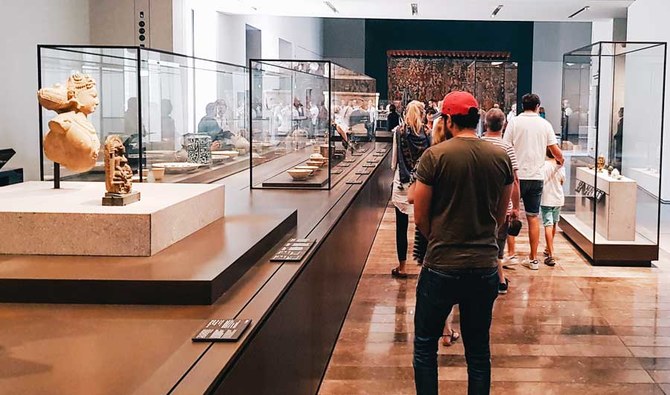JEDDAH: A virtual debate exploring a new world of art and culture in a post-COVID world was hosted by the King Abdul Aziz Center for World Culture (Ithra) in partnership with UNESCO.
The forum, titled “Dystopia to Utopia: Our Changing Cultural Landscape,” included six panelists from around the world, who discussed the post-pandemic cultural landscape in the Arab world, given the importance of cultural and creative industries in developing economies and promoting social cohesion.
“People need culture. Culture makes us resilient and gives us hope,” said Anna Paolini, director of the UNESCO Office for the Gulf Cooperation Council and Yemen.
She added: “The International Labour Organization estimated that in the first quarter of this year, the loss of employment will total 305 million jobs compared with 22 million last year. The creative sector is one of the most affected.”
The pandemic has affected the entire creative value chain, including creation, production, distribution, and access, she said.
It has also weakened the professional, social, and economic status of artists and cultural professionals.
According to a UNESCO report, 90 percent of museum had closed their doors in the pandemic, including all 370 museums in the Arab region. More than 10 percent may never reopen.
As a response to the impact on the cultural sector, UNESCO launched the ResiliArt campaign and social media movement to support artists and the cultural sector. The discussion, moderated by writer and curator Laura Egerton, aimed to re-imagine the future of an industry clouded in uncertainty.
Virtual existence
On a positive note, panelists said that the crisis had pushed people to engage more in artistic and cultural content as they adapted to a virtual existence.
Dr. Nada Shabout, an associate professor of art history and the director of the Contemporary Arab and Muslim Studies Institute at the University of North Texas, said the crisis had been an opportunity within an unfortunate situation to experience new adventures.
HIGHLIGHTS
• Panelists highlight the importance of creative industries in developing economies and promoting social cohesion.
• According to a UNESCO report, 90 percent of museums had closed their doors in the pandemic, including all 370 museums in the Arab region.
• As a response to the impact on the cultural sector, UNESCO launched the ResiliArt campaign and social media movement to support artists and the cultural sector.
“As a professor of art history, we had to shift immediately without notice to teaching online. I was surprised to see how useful this method is. We are able to engage in more focused discussion,” she said.
As part of the transition toward a virtual world, Shabout said there was a greater focus on offering virtual products, with many exhibitions and events moving online.
However, Shabout believes that initiatives need to be based locally before becoming globally connected, in an attempt to preserve and understand local context.
Dr. Linda Komaroff, department head of Arts of the Middle East at Los Angeles County Museum of Art, said: “What I am hoping is that we learn from this time in being creative with new online experiences and incorporate that in the way we think about exhibitions, especially for archival purposes.”
Akram Zaatari, a Lebanese archival artist and curator, said solidarity among members of the art community is essential in allowing the art and cultural sector to recover from the crisis.
Zaatari believes that there is no place for competition in a time of crisis. He said artists from different generations should get together and support one another.
“The practice is more important than the quality, especially in a time where art functions as a historical record for the future,” he said, adding: “You may not like it now, but someone might come in the future and see in it something exceptional that you could not see today.”
Sheikha Hala bint Mohammed Al-Khalifa, culture and arts director of Bahrain’s Authority for Culture and Antiquities, shared Zaatari’s sentiment on the role of individuals in the community.
She said the primary role for public cultural institutions is to inspire.
“These institutions play a huge role in nurturing the youth through education and social initiatives that target young artists,” she added.

































